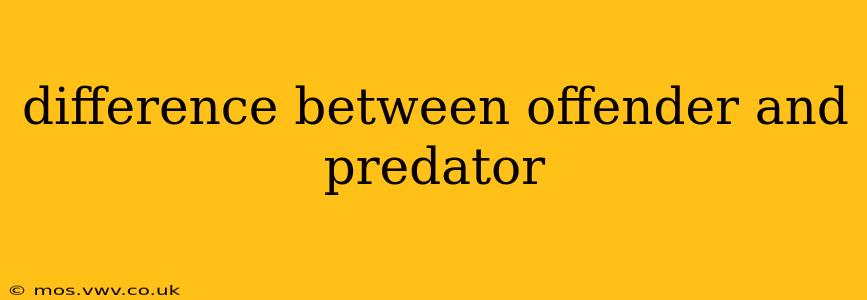Offender vs. Predator: Understanding the Nuances of Harmful Behavior
The terms "offender" and "predator" are often used interchangeably, especially in casual conversation about crime. However, there are crucial distinctions between the two, particularly when analyzing the motivations, behaviors, and implications of harmful actions. While both terms refer to individuals who have caused harm, their connotations and the context in which they are used differ significantly.
What is an Offender?
An offender is a broad term encompassing anyone who has committed a crime or violated a law. This definition is inclusive, covering a wide spectrum of offenses, from minor infractions like speeding tickets to serious felonies like assault or murder. The focus is on the act itself – the violation of a legal code. The offender's motivations, planning, and psychological profile are not necessarily central to the definition.
What is a Predator?
A predator, on the other hand, suggests a more deliberate, calculated, and often manipulative pattern of behavior aimed at exploiting or harming others. Predatory behavior implies a proactive pursuit of a victim, often involving stalking, grooming, or other manipulative tactics to gain trust before inflicting harm. The emphasis is on the process of targeting and harming, highlighting the offender's active role in selecting and manipulating their victim. This term is frequently associated with sexual offenses, but it can also apply to other forms of exploitation, such as financial fraud or bullying.
Key Differences: A Comparison Table
| Feature | Offender | Predator |
|---|---|---|
| Definition | Anyone who commits a crime or violation. | Someone who actively seeks out and exploits victims. |
| Focus | The act itself. | The process of targeting and harming. |
| Motivation | Can vary widely. | Often involves power, control, and exploitation. |
| Planning | May range from impulsive to premeditated. | Usually involves premeditation and planning. |
| Behavior | Can be a single act or repeated offenses. | Often involves a pattern of manipulative behavior. |
| Victim Selection | May be random or opportunistic. | Often involves deliberate victim selection. |
What are the implications of using these terms?
The choice of terminology significantly impacts how we perceive and respond to harmful behavior. Using "offender" might emphasize the legal aspects of the crime, while "predator" evokes a stronger sense of danger and deliberate malice. This difference in connotation can influence sentencing, public perception, and the design of preventative measures.
Is there overlap between the two terms?
It's important to note that there is overlap. All predators are offenders, but not all offenders are predators. A person who commits a crime of passion, for instance, might be considered an offender but not necessarily a predator. Conversely, a serial killer is clearly both an offender and a predator.
What are the legal implications?
The legal system typically doesn't explicitly categorize individuals as "predators." Instead, legal classifications focus on the specific crimes committed and their associated penalties. However, the concept of predatory behavior is often relevant in sentencing, especially in cases involving vulnerable victims. Judges may consider the manipulative tactics employed by the offender when determining the appropriate punishment.
In conclusion, while seemingly interchangeable, the terms "offender" and "predator" carry distinct connotations and highlight different aspects of harmful behavior. Understanding this distinction is crucial for accurate communication, effective crime prevention, and a more nuanced approach to justice.
